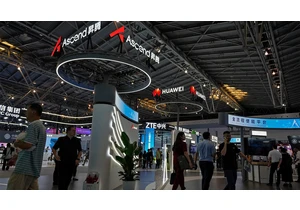So much of the technology showcased at CES includes gadgets made to improve consumers’ lives—whether by leveraging AI to make devices that help people become more efficient, by creating companions to cure loneliness, or by providing tools that help people with mental and physical health.
But not all innovation is good, according to a panel of self-described dystopia experts that has judged some products as “Worst in Show.” The award that no company wants to win calls out the “least repairable, least private, and least sustainable products on display.”
“We’re seeing more and more of these things that have basically surveillance technology built into them, and it enables some cool things,” Liz Chamberlain, director of sustainability at the e-commerce site iFixit told The Associated Press. “But it also means that now we’ve got microphones and cameras in our washing machines, refrigerators and that really is an industry-wide problem.”
The fourth annual contest announced its decisions Thursday.
A new smart ring every few years?
Kyle Wiens, CEO of iFixit, awarded the Ultrahuman Rare Luxury Smart Ring the title of “least repairable.”
The rings, which come in colors like dune and desert sand, cost $2,200. Wiens said the jewelry “looks sleek but hides a major flaw: its battery only lasts 500 charges.” Worse, he said, is the fact that replacing the battery is impossible without destroying the device entirely.
“Luxury items may be fleeting, but two years of use for $2,200 is a new low,” he said.
An AI-powered smart crib?
Bosch’s “Revol” crib uses sensors, cameras and AI that the company says can help monitor vital signs like how an infant is sleeping, their heart and respiratory rates, and more. The crib can also rock gently if the baby needs help falling asleep and signal to parents if a blanket or other object is interfering with breathing.
The company says users can how and where their data is stored. Bosch also says the crib can be transformed into a desk as children get older.
But EFF Executive Director Cindy Cohn said the crib preys on parents’ fears and “collects excessive data about babies via a camera, microphone, and even a radar sensor.”
“Parents expect safety and comfort—not surveillance and privacy risks—in their children’s cribs,” she said in the report.
Too much waste?
Although AI is everywhere at CES, Stacey Higginbotham, a policy Fellow at Consumer Reports, felt that SoundHound AI’s In-Car Commerce Ecosystem, powered by its Automotive AI, pushes it to unnecessary extremes.
The feature “increases energy consumption, encourages wasteful takeout consumption and distracts drivers—all while adding little value,” Higginbotham said. That landed the in-car system as “least sustainable” on the list.
Vulnerable to hacking
TP-Link’s Archer BE900 router won for “least secure” of CES. The company is a top-selling router brand in the U.S. But its products are vulnerable to hacking, said Paul Roberts, founder of The Security Ledger.
“By Chinese law, TP-Link must report security flaws to the government before alerting the public, creating a significant national security risk,” he said. “Yet TP-Link showcased its Archer BE900 router at CES without addressing these vulnerabilities.”
Who asked for this?
The awards also feature a category called “who asked for this?” Top of that list was Samsung’s Bespoke AI Washing Machine, which Nathan Proctor, senior director of U.S. PIRG, a consumer advocacy group, said is filled “with features no one needs,” including the ability to make phone calls.
“These add-ons only make the appliance more expensive, fragile, and harder to repair,” he said.
The worst overall
Gay Gordon-Byrne, executive director of The Repair Association called the LG “AI Home Inside 2.0 Refrigerator with ThinkQ” the worst product overall. The fridge adds “flashy features,” Gordon-Byrne said, including a screen and internet connection.
“But these come at a cost,” Gordon-Byrne said. “Shorter software support, higher energy consumption, and expensive repairs reduce the fridge’s practical lifespan, leaving consumers with an expensive, wasteful gadget.”
—Sarah Parvini, AP Technology Writer
Chcete-li přidat komentář, přihlaste se
Ostatní příspěvky v této skupině

A U.S. judge has ruled that China’s Huawei Technologies

Shares of U.K.’s Bytes Technology plunged over 27% on Wednesday after the IT firm said its operating profit for the first half of fiscal 2026 would be marginally lower due to delayed custome

Donald Trump’s Big Beautiful Bill Act has passed through the Senate thanks to

To a certain brand of policy wonk, January 31, 2025, is a day that will live in infamy.
It had been nearly two weeks since President Donald Trump took office for the second time—days th

For a few days, my finger would hover over the TikTok hole on my home screen. But

How far would you travel in search of a sweet treat?
“Bakery tourism” is on the rise, with more and more people traveling—sometimes across the globe—in search of the perfect flaky croiss
